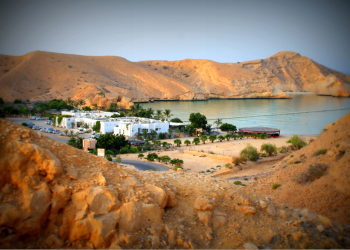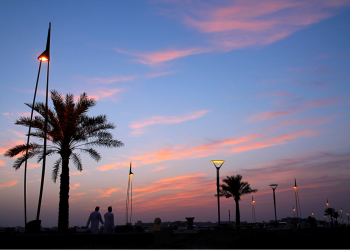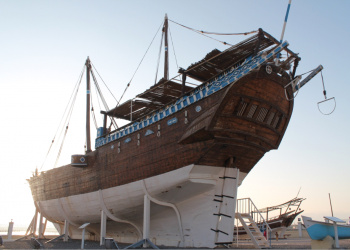
Native Filipino, Allan is now living in Oman, in the south of Arabian Peninsula. This dancer, writer but especially traveler gives us his testimony about living in a country culturally completely different than Philippines and how he succeeds to adapt himself.
Hi Allan, can you introduce yourself quickly and tell us about your projects in Oman?
Dancer. Photographer. Writer. Traveler. Frustrated Singer. Yoga Practitioner. I'm Allan Yasser Zeta Abdula, 30, from the Philippines. I have been working as contracts executive in Elite Travel and Tourism since July 2016. I am also handling the Human Resources functions for our company. Mainly what I do is to ensure that all hotel partners' contracts are well received and rates encoded in our reservations system. The rest of the day is spent on recruiting people and updating employee records e.g. forms, training plans, performance assessments, etc.
I don't consider myself much of a sociable person, but in our industry this is part of the job. We meet clients and business partners everyday, and most of the time they become good friends too; you discover that they share the same passions as you do.
For instance, I have been deeply involved in salsa dancing when I arrived in Oman. To be honest, I do not have any idea what this dance is all about. I just thought I would give it a try and later on, I got hooked to it. It also made my circle of friends even bigger, and from then on I became a part of regular social gatherings like house parties, dhow cruises, club dancing, performances, and many more.
Recently, I discovered a yoga class in Muscat and I have devoted twice a week attending it. It helped me to relieve of my stress and become more in tune with my spiritual side.
Finally, when not doing anything else, I update my websites. I maintain several websites for each interest. I have the following website where I share most of my activities: Expat In The City.
Why did you choose to live in Oman?
It's a difficult question to answer. Perhaps it's better to ask, 'why did you choose to work in Oman?' because I didn't intend to live in Oman, per se. Everything was due to circumstance. Right after working in Saudi Arabia for a couple of years, I decided to go back to the Philippines and see what I can find there. It was more like testing the waters, so to speak. When I could not find what I was looking for in the Philippines, I figured maybe I am better off in another country. Then a good friend of mine recommended Oman, although to be honest I have not heard about Oman prior to my arrival to the country. All I knew was that I will be back to the Middle East. Was I excited? Deep down, yes I was. After all, I will be out of my country, out of my comfort zone. You have no idea what two years in Saudi can do to you. So when I finally arrived in Oman, I was expecting a Saudi-like atmosphere; but I was surprised to find out my expectations were totally wrong. I daresay, now that I think about it, Oman is probably the best place in the GCC.
So if you ask me, would I choose to live in Oman? Then my answer is a definite yes.
How were your first steps in the country ? Was it easy to find accomodations and to integrate omani society?
As an Asian hailing from the tropical regions, the weather was one of the most challenging part in my initial days. When you are used to rain and temperate climate, Oman's 40 to 50 degrees is something an expat like me would require some adjusting to. I was sweating like a faucet and was not able to walk long distances. This made it difficult for me do my daily activities, and you compound it with the fact that in Oman, transportation is limited to taxis and vans which are not so helpful considering that taxi drivers do not use meters and do not speak English much. It's one thing to not be able to find means of transportation, and another to communicate with taxi drivers on how and where you want to go. So this aspect of my stay in Oman probably hindered me to maximize my stay in the country. I mean, there are lots of beautiful places to visit but in the absence of a vehicle, it's just a no-go for expats like me who cannot afford to purchase his own car.
In terms of accommodation, I am lucky that my company is providing this as a benefit to its employees. I cannot really complain, especially when I hear from my friends that finding a good housing in Muscat is challenging, with prices ranging from 200 - 500 OMR per month (depends on how big the house is, where it is located, and what comes with the house). My company has provided us an accommodation that is decent for living.
And finally, on Omani society; well I would like to think that due to communication barrier, there isn't much interaction between expats and local Omanis. I do believe that Omani people are probably the kindest people in the GCC, with smiles on their faces and always ready to help when needed. They are very gentle people and I have very high regard for them. Just reading on the Omani history gives one a broad understanding on what Omanis have gone through and what shaped them to who they are today. In my many encounters with Omanis, I can attest that they always have an amicable way of dealing with people, both locals and expats so it's not really difficult to integrate within their society.

Do you have a good knowledge about the local job market? What are the most dynamic economic sectors?
I cannot claim expertise on the job market, but in my opinion Oman provides employment to the following industries:
⦁ Construction and Engineering e.g. PDO, Towell Constructions
⦁ Travel and Tourism e.g. Elite Travel and Tourism, Bahwan NTT, Zahara Tours, Mark Travel
⦁ Banking e.g. Bank Muscat, Bank Dhofar, HSBC, NBO
⦁ Accounting and Finance
⦁ Education / Teaching
⦁ Medical Professions e.g. Doctors, Nurses, Dentists, etc.
Is life expensive in Oman?
Yes, compared to the cost of living in Asia, for example. Most of the goods in Oman are doubled and sometimes tripled compared to the prices from which I come from. It is even more expensive if you purchase meals from restaurants on a regular basis. And since transportation is an additional expense, you will also have to consider that too.
A sample calculation which I made
⦁ Lunch (take away) = 2 OMR x 30 days = 60 OMR
⦁ Dinner (take away) = 2 OMR x 30 days = 60 OMR
⦁ Taxi fare = 5 OMR per day x 30 days = 150 OMR
⦁ Grocery = 100 OMR per month = 100 OMR
⦁ Mobile Credit = 5 OMR per month = 5 OMR
⦁ Internet Bill = 25 OMR per month = 25 OMR
⦁ Weekend Night Outs = 10 OMR per day x 8 days = 80 OMR
⦁ Miscellaneous Expenses = 20 OMR per month =
⦁ TOTAL = 500 OMR
If you are not careful about your expenses, then all your salary will only go to expenses. This is how expensive it is to live in Oman. Can you imagine spending 500 OMR (and I'm being modest with this sample budgeting) ? This is why expats like us usually have to devise some clever ideas on how to slash on those common expenses just to make sure that we have some amount to send back to our families in the Philippines.

How can you describe omani culture compared to philippinian culture?
The difference between Omani and Philippine culture is of course very obvious. In order for me to discuss these differences, allow me to point out some practices in the Philippines which are not/cannot be practiced by Omanis:
⦁ Using ma'am / sir when talking to someone who's perceived with a job high position
⦁ Calling people by making the sound "pssst" and using the words "hoy"
⦁ Raising eyebrows to signify agreement to a statement
⦁ Walking outside the house without shirt on (for men)
⦁ Walking outside the house with mini skirts (for women)
⦁ Eating Filipino food particularly pork cuisine
⦁ Cooking dried fish of which smell can reach several houses in the neighborhood
⦁ Praying the rosary in public or carrying the Bible in public
⦁ Men don't touch each other (it is considered a no-no, much more to two men kissing)
⦁ Belting songs in the karaoke in the middle of the day which can be heard miles away
I'm sure there are many more examples, but the above are the most common ones. In work setting for example,
⦁ Omanis are very indirect (and this is especially true when it comes to pointing out negative characters of a colleague, that they rather let the issue stall than offend anyone. In fact, Omanis I know would rather lose the job than offend a friend)
⦁ The concept of time in Oman is different, that if you call for an 8:30 appointment, it means 9:00
⦁ The way arguments in Oman is also peculiar; as involved parties generally don't flare up but are calm and composed
⦁ Family ties and friendships are very strong in Oman (in fact, nepotism is probably common in many offices because it's all about who you know, and not what you know)
What does you everyday life look like in Oman? The omani's rhythm is different right?
In the morning, whenever I go to our office, Oman looked like a brown slumbering bear, peaceful and calm. We usually start our day at 9am, but Omanis usually begin a little later. In a sense, yes Omani's rhythm is different. They are more active at night than in the morning. Usually when I go out, I notice that traffic can still build up at 9pm. And that shops and restaurants are packed until 2am. Sometimes I even see families having picnics in public areas at 1am. It really amazes me how they can stay up all night; but perhaps that's the reason why they are delayed in the morning. Can't really blame them because the morning is normally hot, and it is only that latter part of the day when it is bearable to work. On Fridays, it is even more quiet because people don't go out until after lunch time due to prayers. Saturdays are devoted to families and most places are teeming with families, everywhere becomes so alive you wonder where these people all come from (when weekdays looked like it was a post-apocalyptic scenario).
How could you describe the culinary tradition in Oman?
I must say that Omani cuisine is exquisite, and since most of these food are rice based; they are even closer to our Asian taste buds. One particular Omani dish I enjoy a lot is the 'shuwa'. It is a dish made by slow cooking beef under pressure cooker or in traditional way, burying the beef underground with fire (for days). And they pull up the meat after the nth day. The result is a tasty and yummy flavorful meat which is best eaten with specially prepared rice.
Also, since Oman is rich with marine life, their seafood cuisine is one to die for. Just a couple of days ago, we had sample of grilled Hamoor and Red Snapper which couldn't taste better. It was so fresh you won't even think that it's fish. Plus the lobsters are abundant and you can help yourself as much as you want (although this can be pricey).
Overall, I would say that Omani cuisine is very healthy and enjoyable.

The country seems very desertic, are they different landscapes in Oman ? Which parts did you visit?
Indeed, Oman has deserts as in the Sharkiya Region and Ubar, but the landscape is so dynamic that it is probably in Oman that you can find the mountains of the Hajjar kissing the seashores of Qantab. Not to mention the grand mountains of Jabal Akhdar and Jebel Shams, where temperature are constantly better all throughout the year, with flowers blooming during the months of April. The seas and beaches of Musandam and Salalah are home to some of the finest aquatic animals in the planet like dolphins and sharks.
To date, I have been around the interiors of Muscat such as Nizwa, Sur, Mountains and desert. Of all these places, I find the Wahiba desert the most interesting experience. There in the desert, you lose track of time and everything is so quiet and still. It's like the stillness is enough to calm you down and ease your worries. The sunset is also very stunning, while you watch it go down lying peacefully on the fine sand.
Any advices for a soon-to-be expatriate in Oman?
My only advise is to enjoy Oman as much you can. Explore the country, travel while you can. Travel even you can't, because I'm sure you'll find a way to do it. As expats, we are staying in Oman on a very limited time and each day counts. So everytime you let your chance pass you by to see the beautiful country, you lose chance to make the most out of your stay. Surely, it is not cheap to travel but your travels will be all worth it. As they say, traveling is the only expense that makes you richer.
And while you are in Oman, meet people. Meet many people and interact with them. Grow your network and allow yourself to open up with people who come from different backgrounds because you will learn from them, perhaps not so much important to you at the moment but in time you will realize that these connections you build will prove essential in the future. And when you build these connections, make sure that you also become a bridge for others. Life is a give and take act, perform your character well. Life's your stage, make sure you play your part well.



















